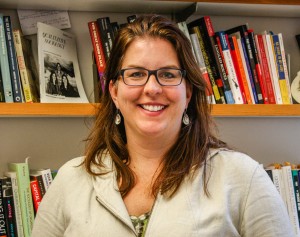
The concept of death is not a comfortable one for many people and although it is a subject matter that we often avoid talking about, it is the main topic of Sociology professor Karla Erickson’s new book, “How We Die Now: Intimacy and the Work of Dying.”
“When I first started the work, everyone would tell me, “oh how depressing,” but it hasn’t been that way at all; it’s been really invigorating,” Erickson said. “My book is about the changes in our life span. We live as much as 30 years longer than our recent ancestors, but we also die more slowly and in different ways.”
The book investigates end-of-life issues from the perspectives of patients, relatives, medical staff and elderly-care workers. Research was conducted over a period of two years with the help of 12 Grinnell students. Together they interviewed 50 workers in continuing care retirement communities to understand how death is dealt with.
Erickson was very focused on the evolution of “how we die now.”
“To understand this, I looked at the expertise of the people who are end-of-life workers. I’m interested in what they know, because they’ve spent their lives helping these people who are living longer lives and slower deaths,” Erickson said.
Erickson became inspired to write this book after seeing her grandparents being taken care of in a hospice.
“Just seeing these people seem really confident in their work and very effective in their counseling to grieving relatives made me think ‘how do [they] know what they know?’” Erickson said.
In order to understand the work involved in nursing homes, Erickson trained as a nurse’s aide.
“I wanted a very ‘in the trenches’ type of research so that I could be in the world that these caretakers are. Going from being a professor to a nurse’s aide was very profound in how complicated the job as a nurse’s aide was,” she said.
The research conducted in the book was all from small-town, Midwest nursing homes. This factor of the book highly influenced the direction of the interviews. Due to Erickson only reaching out to small-town nursing homes, there was a much more communal feel in the relationship between the caretakers and the patient than what could have been found in an urban nursing home.
“The residence and the staff were really racially homogenous, and I think that that matters. It really affects the community, and some of the intimacy that I saw may actually have been facilitated by being mono-racial,” Erickson said. “The racial complexity that would be apparent in an urban environment would complicate the studies that I saw in Grinnell.”
Erickson uses her new book as part of her curriculum in the tutorial class that she teaches. Her book has influenced her students’ previous perspective on death and has clearly influenced her own perspective on death.
“I now have plans in place for my loved ones if they die. I think that being around people who are really aware of their mortality, and how close they are to their mortality makes you grapple with what really matters. It has allowed me to re-prioritize things in my life,” Erickson said.
Currently, Erickson is working on a new project about the current generation and how they deal with a changing global economy. Next spring, she and a few students will conduct research by contacting Grinnell alumni between the graduation years of 1970 to 2013, and comparing their experiences in the workforce. Her work tends to have a theme surrounding intimacy in the marketplace.
“My first book was about restaurant workers who developed a community. I was interested in these places in the marketplace that develop these close relationships in their business. This can be applied to my most recent book. I was interested in the fact that we pay people to usher us through the death process. I’m still asking the same questions as I did in my previous books; I’m curious to research how we connect with people who aren’t our kin,” Erickson said.
For more information about “How We Die Now: Intimacy and the Work of Dying,” go to www.temple.edu/tempress/titles/2193_reg.html.




























































